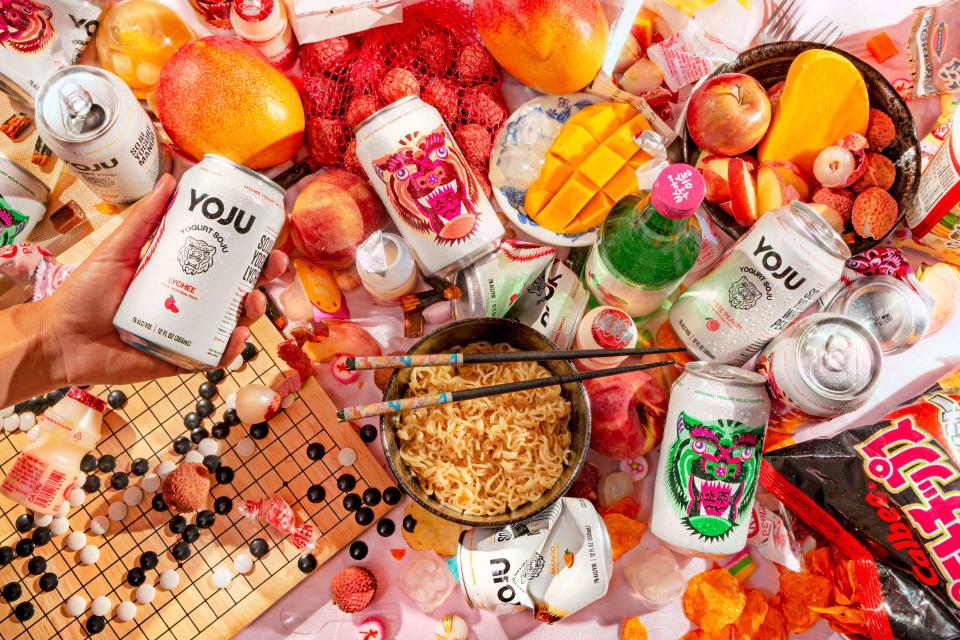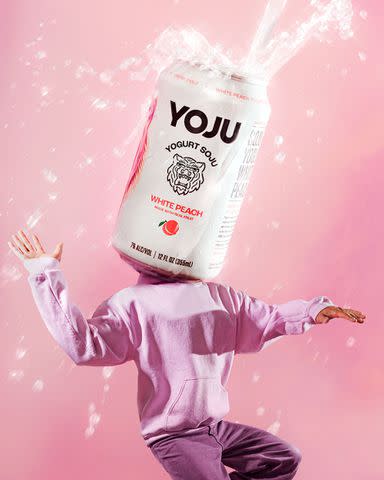This Boozy Korean Yogurt Beverage Is My New Favorite Drink
This popular Korean drink is making waves in the American RTD market.

Steven Lee
This may come as a shock, but writing about drinks for a living means you have to, well, try a lot of drinks. Keeping tabs on what’s new is par for the course, and ready-to-drink cocktails are an integral focus: according to Drizly’s BevAlc Insights, the category has enjoyed “stratospheric” growth in the last few years; While it represented just 1.1% of Drizly’s total sales in 2020, that number jumped to 1.9% in 2021, and to 2.8% in 2022. Meanwhile, market research firm Grand View Research expects canned cocktails to grow at a rate of 13.4% from 2022 to 2030. Personally, however, none of these fuss-free tipples have ever been something I wanted to keep stocked in my fridge — that is, until YOJU came along.
It was while researching a story I wrote on Asian flavors in hard seltzer that Steven Tang, cofounder of Los Angeles-based seltzer company Drunk Fruit, told me about another company that he and cofounder Kenn Miller had recently launched. YOJU is a canned, ready-to-drink iteration of yogurt soju, a popular cocktail in Korea combining drinkable yogurt and soda for a bright, sweet, effervescent result, and it represents an exciting step in diversity and representation in the American drinks space. While Drunk Fruit acclimates a Western audience to Asian flavors within a largely Western drink category (hard seltzer), YOJU reaches the next level with a wholly Asian beverage.
Tang and Miller first began introducing people to yogurt soju in college in 2010 by making their own versions of the drink to share with friends. They’d combine soju (a Korean neutral grain spirit akin to vodka), a carbonated beverage like Sprite, and a yogurt drink like Yakult. “People got turned off when they heard the word ‘yogurt,’” Tang says, explaining that American drinkers immediately think of something thick they’d eat, like Greek yogurt, rather than the lighter, smoother drinks like Japanese Yakult.
While the idea of yogurt in the beverage space may have been a harder sell to American consumers in the past, an alcoholic spin on something as popular as Yakult was a more natural progression in Korea, where the combination was initially “a drink more for the bar crowd…a little rough around the edges…We’d drink it with anju (bar snacks) and very spicy Korean fried chicken,” according to editor, consultant, and author of several Asian cookbooks, Naomi Imatome-Yun.
She says yogurt soju is likely to have bubbled up in the 1980s or early ‘90s, given that Yakult has been popular since the ‘80s. “Koreans are very interested and invested in food and drinks that enhance health, and yogurt and probiotics are part of this,” she notes. The yogurt soju cocktail’s journey to the United States isn’t much easier to pin down than its origin. Imatome-Yun points to an article she wrote about 15 years ago (updated since), “which means yogurt soju has been in American K-Towns since probably the late ‘90s/early 2000s.”
Related: A Drink That Dates Back 2,000 Years Is Making a Comeback Thanks to One Woman
Meanwhile, in the United States, soju has been undergoing something of a renaissance,with more artisanal brands entering the space, and subsequently spiking consumer interest. Yogurt beverages aren’t nearly as unfamiliar to American drinkers as they might have been when Tang and Miller were pouring their DIY yogurt soju cocktail for friends in college, now that wellness trends have led US consumers to explore products like kefir, a fermented milk from Eastern Europe, as well as probiotic drinks like kombucha.
As brands in American beverage alcohol look for ways to differentiate and engage more consumers, Asian flavors and product trends are of particular interest for many imbibers. According to Caleb Bryant, associate director of food and drink at market research firm Mintel, 23% of Gen Z and 22% of Millennial alcohol consumers say they’d try a new flavor of an alcoholic beverage if it was an internationally inspired flavor, and Asian-inspired flavors and ingredients are trending across food and beverage categories.

Steven Lee
The way the yogurt plays against bright fruit flavors like lychee, white peach, and mango, as well as its crisp effervescence is what made me an instant fan. Tang uses adjectives like tart, creamy, and refreshing to describe YOJU, and compares it to a creamsicle or cream soda. He’s right — each sip provides this soft, rounded sweetness, a sort of slightly fuller mouthfeel, but it’s still light and refreshing. In other words, forget any preconceived notions that yogurt soju is thick like a smoothie. And when it comes to YOJU in particular, toss aside any assumptions that flavors will come across as artificial.
“Many of the [non-alcoholic] Asian yogurt drinks on shelves, they’re neon orange for mango, or neon green for melon; it’s a lot of artificial flavors,” Tang says. “We’re inspired by yogurt drinks but also want to create a high-quality cocktail.” Tang and Miller use actual yogurt (in powdered form; the dairy content is low) and real fruit purees, sweetened with a little cane sugar.
YOJU is currently available to order online, and can be found in Whole Foods stores in California and in the Washington DC area. Tang says the brand’s next steps are exploring new flavors and growing distribution across more states. Even though it has to overcome many American consumers’ initial disinclination, YOJU is a much needed step toward inclusivity in America’s canned booze market. Plus, it pairs perfectly with everything from that spicy Korean fried chicken to al pastor tacos (trust me), and it’s different and exciting enough to intrigue even a jaded drinks writer.
For more Food & Wine news, make sure to sign up for our newsletter!
Read the original article on Food & Wine.

